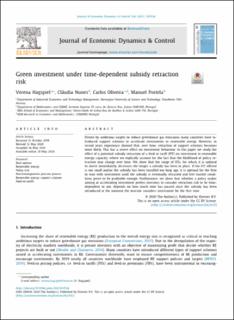Green investment under time-dependent subsidy retraction risk
Peer reviewed, Journal article
Published version

Åpne
Permanent lenke
https://hdl.handle.net/11250/2775045Utgivelsesdato
2020Metadata
Vis full innførselSamlinger
Originalversjon
10.1016/j.jedc.2020.103936Sammendrag
Driven by ambitious targets to reduce greenhouse gas emissions many countries have introduced support schemes to accelerate investments in renewable energy. However, in recent years experience showed that, over time, retraction of support schemes becomes more likely. This has a severe effect on investment behaviour. In this paper we study the effect of a potential subsidy retraction of a feed-in tariff (FIT) on investment in renewable energy capacity, where we explicitly account for the fact that the likelihood of policy retraction may change over time. We show that the range of FITs, for which it is optimal to invest immediately, decreases the longer a subsidy has been in place. If the FIT offered is too small and/or the subsidy has been installed too long ago, it is optimal for the firm to wait with investment until the subsidy is eventually retracted and free market conditions prove to be profitable enough. Furthermore, we show that whether a policy maker aiming at accelerating investment prefers investors to consider retraction risk to be time-dependent or not, depends on how much time has passed since the subsidy has been introduced at the moment the investor considers investment for the first time.
